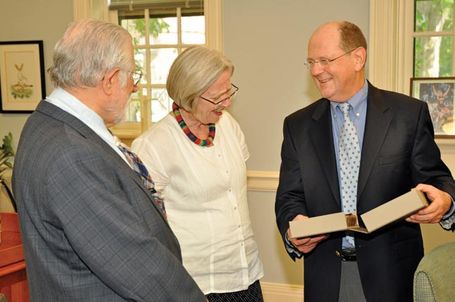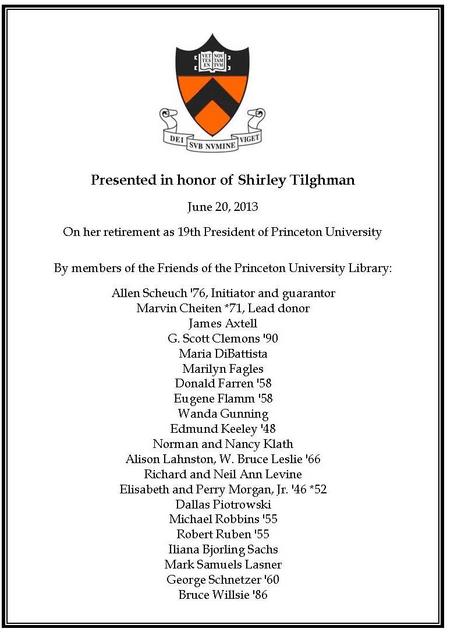The retirement of Shirley Tilghman as the19th President of Princeton University at the end of June 2013 provided an opportunity for the Friends of the Princeton University Library to celebrate the presidency of the University by making a gift to the Library in her honor. The Special Collections curators presented a wide range of possibilities to identify a suitable purchase. The choice: one of the extremely rare books that can be documented as having belonged to Jonathan Dickinson (1688-1747), the first President of the College of New Jersey.
At its modest beginning in 1746 in Dickinson’s parsonage in Elizabeth, the college consisted of the president, one tutor, and eight or ten students. Dickinson’s books were the college library. Tactica Sacra (Sacred Strategies), by John Arrowsmith, Puritan divine of Trinity College, Cambridge, is a manual for the spiritual warrior, part of the armament of clergyman Dickinson. A large quarto of 400 pages in its original 17th-century full calf binding, the book carries an inscription on its title page in Dickinson’s hand: “Jonathan Dickinson’s Book… .” The group of Friends who supported the acquisition are named on a bookplate added to the volume.
The University’s efforts to acquire books with a Princeton association started in earnest during the second half the 19th century. The extant books belonging to Jonathan Edwards were added, as well as some from other early presidents, including Samuel Finley. John Witherspoon’s books had been acquired in the first part of the 19th century due to the efforts of his son-in-law Samuel Stanhope Smith. These volumes were purchased not so much because they had belonged to Witherspoon but because, after the Nassau Hall fire of 1802, the college needed books. Recognition of the associational value of the Witherspoon books came to a climax during the librarianship of Julian Boyd. In the early 1940s Boyd instructed rare book librarian Julie Hudson to reassemble the Witherspoon library, which had been dispersed throughout the collections. The earliest survivors of the college library are on view in the Eighteenth-Century Room, just inside the entrance to the Main Exhibition Gallery in Firestone Library.
Tactica Sacra is the Library’s first book from Dickinson’s library with his statement of ownership. Given some years ago was a copy of Poole’s Annotations (2 vols.; London, 1683-1685), which has a record of Dickinson’s family and offspring in his hand on the verso of the last leaf of Malachi. However, these volumes lack the title pages, which presumably would have carried his signature and marking that the Poole was “his book.”
In addition to the Dickinson inscription, a hitherto unknown early American book label, “Samuelis Melyen liber,” is fixed to the front pastedown. The Reverend Samuel Melyen was the first minister of the nascent congregations in Elizabeth and environs. Jonathan Dickinson married Melyen’s sister Joanna in 1709, around the time that he began his ministerial work in the Elizabeth Town parish. Melyen died ca. 1711, and Dickinson emerged as the leading minister, a post he held until his death in 1747. Samuel Melyen was clearly the first owner of this book. Dickinson’s inscription in full states that it was a gift of one Mr. Tilley: “Jonathan Dickinson’s Book Ex dono D. Tilley.” The Tilley family and the Melyen family were related by marriage, but the precise identity of “D[ominus (i.e. Mister)]. Tilley” is not yet known. Dickinson apparently owned another book in which he inscribed “Jonathan Dickinson’s Book Ex dono D. Tilley.” It is a copy of Samuel Cradock, The Harmony of the Four Evangelists (London, 1668). The present whereabouts of this copy are unknown; it was last recorded in 1896. Further, recently come to light is a comparably inscribed book held at the Hougton Library: a London, 1688 edition of the Psalms [Details] [Image].
The Princeton association of the Tactica Sacra does not stop with Dickinson. Beneath Dickinson’s inscription is the following: “Jonathan Elmer His Book 1768.” Elmer (Yale 1747) was pastor at New Providence, New Jersey, from 1750 onward. A slip in the book states that after Jonathan Elmer it was owned by Philemon Elmer (1752-1827); then his daughter Catharine, who married Aaron Coe, Princeton 1797 (d. 1857); then by their son the Reverend Philemon Elmer Coe (Princeton 1834); then his sister Catherine Elmer Coe, who married Alfred Mills (Yale 1847); then by their children Edith, Alfred Elmer Mills (Princeton 1882), and Edward K. Mills (Princeton 1896).


